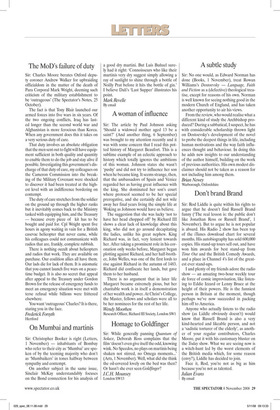A woman of influence
Sir: The article by Paul Johnson asking ‘Should a widowed mother aged 13 be a saint?’ (And another thing, 6 September) was brought to my attention recently and it was with some concern that I read this potted history of Margaret Beaufort. This is a sublime example of an eclectic approach to history which totally ignores the ambitions of this woman. Johnson states she wasn’t ‘pushy’ and did not try to influence her son when he became king. It seems strange, then, that the ambassadors of Spain and Venice regarded her as having great influence with the king. She dominated her son’s court where protocol seemed to be her special prerogative, and she certainly did not wile away her final years living the simple life at Woking as Johnson would have us believe.
The suggestion that she was lucky ‘not to have her head chopped off’ by Richard III shows a clear lack of knowledge about this king, who did not go around decapitating the ladies, unlike his great nephew. King Richard was, in fact, very lenient towards her. After taking a prominent role in his coronation only weeks before, Margaret began plotting against Richard, and her half-brother, John Welles, was one of the first lords to rise against Richard in the autumn of 1483. Richard did confiscate her lands, but gave them to her husband.
There is no argument that in later life Margaret became extremely pious, but her charitable work is in itself a demonstration of her wealth and power. At Christ’s College, the Master, fellows and scholars were all to be her nominees for the rest of her life.
Wendy Moorhen
Research Officer, Richard III Society, London SW1


















































































 Previous page
Previous page